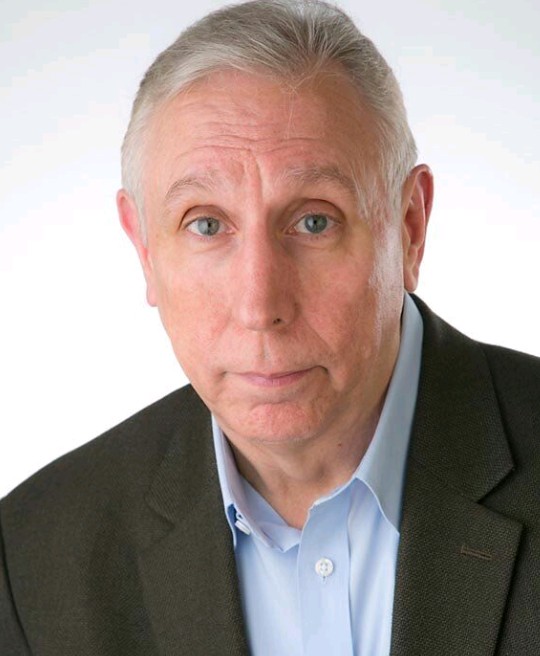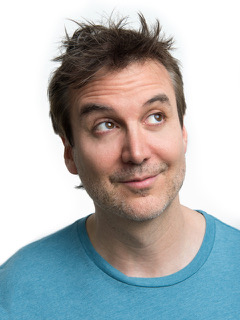The Reinvented (and Always Reinventing) Stand-Up Comic
In a song snippet, dubbed “Denial,” filmed at New York’s Comedy Cellar more than a decade ago, stand-up comic Rick Crom slyly alluded to people kidding themselves when “when they dress in spandex and weigh 300 pounds.” The audience laughed with recognition and appreciation.
Now sporting many hats, not least Guru Teacher of stand-up comics, Crom who has been in the business for more than 40 years, admits that he’d need to do a little revision today to avoid body shaming.
“I have to exaggerate that line to 2,000 pounds,” he says. “Because a lot of people are over 300 pounds and wear spandex. Nobody is 2,000 pounds and it’s so far out, it’s abstract. Even the heaviest person in the room will think, ‘Okay, that’s not about me.’” Tastes and expectations evolve, including his own.
“Short of straight white men, who are fair game—making unkind comments about them is allowed—with everyone else you have to finesse it,” he says. “There will always be provocateurs who attempt to tackle taboo topics and will probably fail. A common question from my students is, ‘Is it okay for me to say this or that?’ Years ago, no one asked that. Everyone is afraid of punching down.”
I spoke with a handful of comics for their respective spins on the ever-changing dos and dont’s—from self-presentation and tone, to the subjects broached onstage: race, gender, disease, disability, politics, and beyond.
Ethnicity, Race, Accents
No one disputes that ethnicity and race continue to be fraught topics especially if the comic is not a member of the “tribe.” He/she is often straddling the thin line between confirming a stereotype or mocking it or both.
“You can talk about ethnicity and race,” says Crom, “but the punchline should not be the ‘other’s’ ethnicity or race, but rather the comic’s insensitivity or inability to grasp something about the minority. The comic’s reaction is far more important than the thing itself because it reveals human frailty and that’s what the audience ideally relates to.”
Stand-up comic Brian Scott McFadden, a regular on the New York comedy club circuit, who has appeared on late night television and as a legit actor on stage and screen, says “comedy turns on a dime.” Still, for the 30-plus years he has been at it, he has not, for example, revised his riff on accents.
“I haven’t needed to change them because I create genuine people,” he says. “I did a piece in Baltimore inspired by an African American family of boxing trainers. There were no caricatures or stereotypes in my performance. It was accurate and respectful. And the Black audiences loved it. It’s always the context, the intent, the energy, and the love.
“ I always strive for awareness and authenticity in what I try to do and say in comedy. My view as a comedian is that you can tackle any difficult subject, but you have to know that the more difficult the subject matter is, the funnier you as a comic need to be to pull it off. And when a comedian can do that, it can be cathartic, exhilarating, and inspiring for an audience to get to see something in a whole new way.”
Jim David, an international headliner and a three-time winner of the MAC Award as well as a Bistro Award for Outstanding Comedian, says that he would not use the “N” word, although during the Simpson trial he did use it in commenting on the racist cop Mark Furhman who employed the “N” word.
Similarly, in years past, he impersonated foreign accents, but not now. “I was told by a young Asian comedian recently that ‘You can’t do that because you’re a white guy.’ I’m not allowed to impersonate a Chinese person or an Indian. I’m not sure Robin Williams or Jonathan Winters would have a career now.”
“In general American comedy skews in a liberal, progressive direction, even if it’s so-called edgy,” says award-winning TV writer/stand-up comic Matt Koff. “Most comics are not trying to be hurtful. Audiences can tell if there is malice or playfulness.” Koff has won an Emmy for his work on the “The Daily Show” with Jon Stewart, and recently the New York Comedy Festival’s 15th annual Funniest Stand-up Comic Competition.
Ethnic comics themselves have been forced to evolve as they’ve become increasingly commonplace. While early on they spent a lot of time pointing to themselves as, well, ethnic comics. “There’s only so much material to discuss on the subject that hasn’t been talked about by another Black or Asian or Hispanic comic,” notes Crom. “Like every other comic, they talk about dating and friends and family and addiction. Addiction and recovery are popular topics for all comics today, but not sexual addiction.”
Addiction, Disease, and Disabilities
The latter potentially evokes an image of the abuse and molestation of women, says Crom. Still, a comic’s openness about his or her diseases, failures, or vulnerabilities is almost expected, making the comic more relatable.
“Self-deprecation is not new,” says Crom. “Decades ago Rodney Dangerfield was saying, ‘I get no respect.’ The difference is that now the comic usually presents himself as the survivor. He has overcome whatever, is no longer a victim, and becomes empowered in the process.”
Pointing to one’s own or some other’s mental and congenital ailments is more problematic. In years past dubbing someone a “retard,” or cruelly imitating the spasmodic movements of an individual suffering from some psychiatric or physical disorder, was comic grist for the mill. On the whole, it’s no longer acceptable.
David recalls a joke involving his autistic cat. “‘He can’t find his litter box, but he can fly,’” he quoted the punchline. “I got a note from a viewer who loved the show until I got to my autistic cat. He said his son was autistic and I should lose the joke.”
Still, controversial comic Shane Gillis, known for boundary pushing, incorporated his bit on Downs Syndrome in a recent SNL appearance. The reactions were mixed. Actor Chris Burke, who has Downs Syndrome, has defended him, arguing that to exclude Downs Syndrome people from comic barbs is a form of discrimination.
Women, Aging, and Sexuality
While misogyny, or what may be viewed as misogyny, is an ongoing tinderbox, a while back it was a source of amusement to underscore women’s alleged limitations, and the audience laughed in cahoots with the comic. A joke, for example, based on the accepted premise that women are bad drivers. Today that would fall flat and probably bring the hecklers out in full force.
In the battle of the sexes, where at one time, the woman would be the butt of the joke, the dynamics have been reversed. “I point to how confused men are as opposed to women’s craziness and contradictions,” says McFadden.
“We can talk about how a husband is afraid of his wife,” says Crom. “But if the joke centers on a woman’s fear of her husband, that’s to be avoided because it brings to mind the violent male and domestic abuse. If the comic is telling the audience that his wife is having an affair with a young stud, that could be a problem unless he explains that it’s his fault and that her actions are justified. ‘Thank God she’s doing it. I can’t keep up with her. I’ll break my hip.’ The unexpected is what makes for the comedy.”
But all agree, no topic today is as high on the what-to-be-worried-about hierarchy as, say, homophobia or transphobia, although gender identity politics has clearly progressed.
“When I came out in the ’90s, there were those in the audience who objected to hearing I was gay,” David recalls. “I remember one heckler said, ‘We didn’t pay all this money to hear a gay comedian.’ I said, ‘Yes, you did.’
“Another grilled me when I talked about my partner. ‘Would you stop shoving your gayness all over me!,’ he shouted. I answered, ‘Sorry, I didn’t mean to ram it down your throat.’”
Today, most audiences, at least in metropolitan areas, are comfortable with a comic’s open homosexuality. They’re even post-“cancel culture” in many instances. “Today it’s totally flipped,” adds Crom. “Now if a young comic is gay it can be a selling point. It checks the diversity box.”
Non-binary or trans comics are still less run-of-the-mill than just plain gay comics in mainstream venues, short of drag shows that often feature non-binary or trans performers. And, as we all know, they are stars in the downtown or alt-cabaret scene. Still, they are making inroads in the more conventional cabaret settings, especially as their acts gain gravitas.
Jaye McBride says that as a trans comic she has a wealth of material and the experience of transitioning has given her a depth as a performer she never anticipated. “Going from peak white male privilege to being a) a woman, and b) a trans woman, showed me a really ugly side of the world,” she notes. And audiences are eager to hear what she has to say.
The first openly transgender comedian to perform at Madison Square Garden, she is a regular at New York City’s “Comedy Cellar,” and in 2021 she was featured as one of the “New Faces” at Montreal’s Just For Laugh’s comedy festival. McBride has also appeared at the Boston Comedy Festival and Bloomington, Indiana’s Limestone Comedy Festival.
“For me, my dos and don’ts haven’t evolved—‘Do be funny, don’t be an asshole,’” she continues. “But what’s weird is that jokes I used to make about being trans that seemed absurd at the time are now actual scare tactics by the right. I tell a joke about how I only transitioned to compete in the Olympics, which I started telling years ago, and now that’s a legit fear for them. I have a few of those. Crazy.”
McBride continues, “The way trans people have become this anathema to Republicans means that they, not everyone, don’t want to hear what I have to say, and definitely don’t want to laugh with me, just at me. I remember I was booked for a VFW [Veterans of Foreign Wars] show and it seemed to be going okay until I started into a joke— that always worked in the city—where I mention that over 250 anti-trans bills were introduced that year. Before I could go on to the next line I heard someone in the back yell ‘Good’. It’s insane. I finished my set, got paid, and got the fuck out of there. The country has changed so much in the last six, seven years. I really don’t think I can go to red states and get booked anymore.”
But across the board—from the most conservative to the most liberal—audiences have become more participatory and not in a positive way, Crom says. “They often take jokes literally and view it as their job to speak up. They feel entitled to comment out loud. They feel part of the show. Maybe that’s their 15 minutes of fame.”
Politics, Timing, and Telling the Truth
Current events are natural fodder for comics, but there are parameters, and timing plays its role. The comics I spoke with, none of whom see themselves as contemporary stand-ins for the highly politicized Lenny Bruce or Mort Sahl, agree that the Israeli-Hamas war is an untouchable topic. It is a gaping wound on all sides.
“Nope, not doing it,” says McBride. “On the one hand, Israeli women were literally raped to death on 10/7; since then it’s been such a salvo of brutish attacks and war crimes against innocent Palestinians. How the fuck can I talk about that on stage and make it funny? And should I? I’m sitting it out because I truly don’t have an answer.”
This past fall a news-oriented stand-up comic, Hasan Minhaj, was the center of a brouhaha when it was alleged he embellished—some said totally fabricated—a racist scenario as the backdrop for his political comedy in which he presented himself as the victim.
The episode brought to the fore the issue of a stand-up comic’s factual accuracy in performance. Is it morally reprehensible for the stand-up comic to stray from the truth?
“Fiction is built in to the comic act. But if you’re using comedy as a shield when you’re dealing with major issues, the misrepresentation can be serious,” says McFadden.
“Many viewed Minhaj as exploitative in co-opting the experiences that others had, but that he personally did not experience” adds Koff. “Still, for the most part, stand-up comedy is not documentation. The closer you get to the truth the funnier it is. I would love to be literally accurate every time I’m onstage. But it could be terribly boring. ‘I fell in love with my wife when she said six words— ‘I don’t like conventionally attractive men.’ She never said that. But as a stand-up comic, I’m playing a fictionalized version of myself, a fictional character.”
What’s Funny and Entertaining
Stand up comics should be afforded a fair degree of latitude all concur, and, as David says, if audience members are offended, they are, of course, free to leave. Among our interviewees, the passwords are mindfulness and adaptation. And, yes that’s arguably more prevalent today than in the past. Still, it’s not viewed as a hardship, but rather their job description.
Koff says he’s put off when comics “talk about ‘cancel culture.’ I’m not saying they’re wrong, but I don’t know why comics who are massively successful pretend to be victims and engender sympathy. In fact, being ‘canceled’ usually helps them. You have to adapt with the times. You can look at it as either a burden or a creative challenge, but don’t blame the audience. It’s your job to make them laugh. It’s not their job to laugh at you.”
###
About the Author
Simi Horwitz is an award-winning feature writer/film reviewer who has been honored by The Newswomen’s Club of New York, The Los Angeles Press Club, The Society for Feature Journalism, the American Jewish Press Association, and the New York Press Club (among others). She received an Honorable Mention from Folio: Eddie and Ozzie Awards for her two drag stories (May 22, 2020, August 4, 2020) published here on BistroAwards.com. More recently, she was the recipient of the 2023 New York Press Club Award and won three 2023 L.A. Press Club Awards., including first prize for film criticism (for reviews published in the Forward). The publications that have printed her work include The New York Times, The Washington Post, The Hollywood Reporter, Film Journal International, and American Theatre. She was an on-staff feature writer at Backstage for fifteen years (1997-2012).









